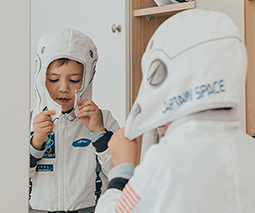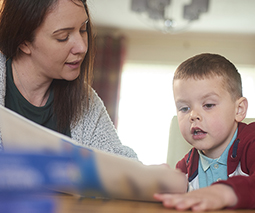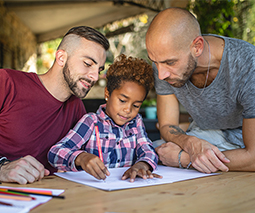Maggie Dent tells us how to support little boys who are starting school

While we’d love to think that boys and girls start on the same level at school, sadly this is not the case.
Research shows boys are behind
Maggie Dent is an author, parenting educator and mother of four and she explains that brain development and brain chemistry differs between the two sexes. This results in different experiences of starting school.
Listen to Maggie Dent on Feed Play Love:
“We have got significant research that shows our little boys are a little bit slower to bloom in terms of the things that are really important in school – and that’s language, communication, being able to sit, follow directions, remember, listen – and they’re biologically wired to play,” she explains.
“Significant research shows that by around five years of age, a statistically significant number of boys are either six to 18 months behind girls in the sorts of things that matter in a classroom, so that’s a worry.”
Boys are emotional
Boys are also more emotionally vulnerable than we think, and when they feel they can’t get something right, they’re not listening, and are feeling confused or frightened, boys can become angry and aggressive. We think they’re being naughty, but in actual fact, they’re not quite coping.
“We need to mindful that boys actually biologically have a little less serotonin than girls, which is a calming chemical neuro-transmitter,” Maggie explains.
“They also run out of dopamine quicker than girls, which helps the capacity to concentrate and stay engaged. Apparently, it’s to do with an enzyme in the muscle layer, because girls mainly have fat whereas boys have more muscle.”

Dopamine and fidgeting
When boys run out of dopamine, but know they have to concentrate, they end up fidgeting in an unconscious attempt to create more of this crucial chemical.
“Often boys get busted because they don’t sit still, and yet they’ve just nothing left in their little dopamine tank,” Maggie continues.
Before they start school, we need to have conversations with our boys about their inevitable need to fidget.
Maggie suggests the following as quiet exercises they can do while sitting in a chair:
- gently rocking
- tapping foot (quietly) on the floor
- squeezing hands or fists together

Maggie also shared a whole bunch of other tips to make the school transition smoother for little boys:
1. Don’t oversell school
Instead of hyping it up, be realistic about what they’ll do and achieve in the first year of primary education. Say to him, “Look this is something we have to do. But the good news is there’s play time and lunch time.” He’ll know there’s a break coming and can look forward to it.
2. Know that boys rarely poo at school
Weird, but true! Quite often it takes them a long time to get to a relaxed place, so they’re unable to get anything out. He probably won’t be able to articulate this to you immediately after school, but you can pre-empt it by asking if he wants to go straight home.
3. Be prepared for the after-school meltdown
“It takes so much energy out of a little boy to listen, to try and remember, follow rules and be good – and that just empties the cup,” Maggie says. “Often, when he sees the person he’s most comfortable with, he just lets all the frustration and emotion out.
“Remember it’s all about brain chemicals. He’s got no dopamine left and no serotonin. He probably won’t let you hug him initially – he just wants to kick you since you’re the one who makes him [go to school],” she laughs.
“Always have some good food prepared to shove in his mouth, because food triggers some good neurochemicals.”
Maggie also suggests that we be prepared to play and “be ridiculous” after a day at school. Laugh, fart and have crazy toys at hand, because novelty can cheer up a boy quite quickly.

4. Avoid interrogation on the way home
At the end of the day, he’s got nothing left in his tank, and can’t wait to get home. Fight your urges to ask a million questions about his day! Instead, be patient, rub his head, ruffle his hair, put some funky music on that he likes, and say nothing. Around bathtime is when boys often start to open up, after he’s had time to regroup and relax.
5. Show him what’s in his lunch box
This is Maggie’s top tip for the absolute first day of school. To get him excited beforehand, show him what he has to look forward to eating at lunchtime!
6. Recognise his emotions
Give him permission to feel a little bit wobbly, frightened and anxious on the first day. Teach him to breathe deeply when he’s unsure, and teach little comfort techniques.
Maggie uses Round and Round the Garden in the palm of their hand as a calming mechanism. If that’s something you’ve played with him growing up, it will trigger the same endorphin pathways that make him feel safe. Another great calming technique is the ‘hug button‘ – simply draw a heart on his hand which he can touch any time he’s feeling anxious or unsure, to remind him that you’ve got his back.
It’s very important to reassure little boys that you will be back to pick them up at the end of the school day. Maggie recognises this sounds ridiculous to us parents, but little boys have a different way of seeing the world. They very often have a fear of abandonment and incredible sensitivity. As well as constantly reassuring him that you will be back, you can try the hug button idea or tuck a little favourite toy at the very bottom of his bag, so he has something to comfort him if needed.

7. Fill up his love cup
“This is a big part of a boy’s life to keep working on,” Maggie says. “The biggest thing for our boys is filling up his love cup, without drowning in ‘I love you’.”
Boys are quite attuned to physical interaction rather than verbal stimuli (unless they have a sensory processing issue). While of course it is important to tell him you love him every single day, there are some other excellent ways to let him know how much he is loved.
Maggie suggests that whenever he’s near, show your affection by holding his hand, tickling him, ruffling his hair, giving him a wink, a thumbs up, or making a funny face! It’s those little connections that will make him feel close to you when you’re not together.
And if your son doesn’t want to come home from school, don’t take it personally! Maggie says that being happy at school is a great sign that he feels loved and connected to his family, and is coping well with the school environment.









